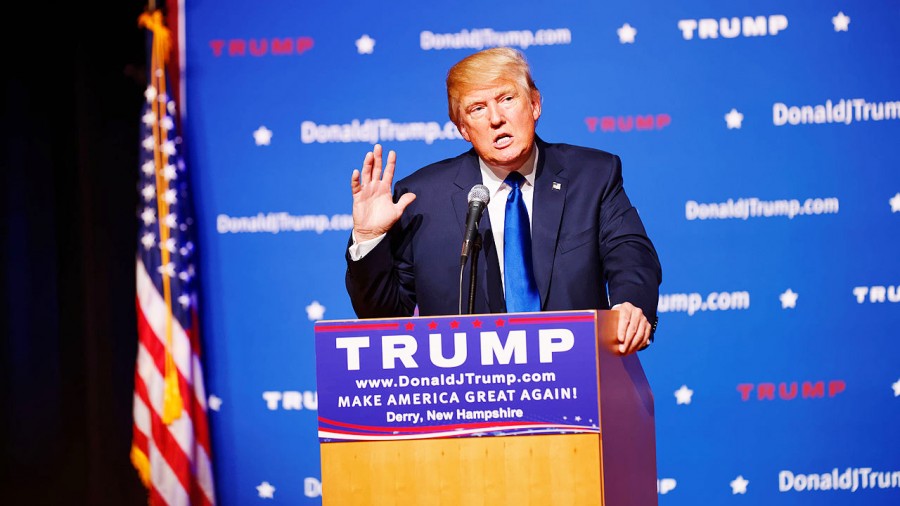After a long wait, Trump releases Health Care plan
March 9, 2016
After months of Donald Trump saying that he will repeal and replace the Affordable Care Act with “something much better,” he released his seven-point health care reform plan last week. The reform addresses a wide array of topics, from making health insurance premiums tax deductible like with business-provided benefits and breaking down state barriers for entry into the healthcare market.
Trump said he believes his plan will broaden access to healthcare across the country and improve the quality of care already provided to citizens. “By following free market principles and working together to create sound public policy that will broaden healthcare access, make healthcare more affordable and improve the quality of the care available to all Americans,” Trump said in his reform plan on his website Donald J Trump.
He is also the first republican to lay out a health care plan to take the place of the Affordable Care Act. Marco Rubio, Ted Cruz and John Kasich have all talked about repealing the current healthcare system, but none have came out fully with a plan.
His first point is, of course, a call to repeal the Affordable Care Act, saying that no person should be required to purchase any sort of insurance unless a person would want the service.
One of the major reasons as to why republicans want to repeal the legislation is due to it forcing people to pay for healthcare by fining those who chose not to purchase a plan. The Affordable Care Act currently fines citizens without insurance either 2.5 percent of their household income or the national average for a Bronze plan sold in the market. Currently that’s $695 for adults and $347.50 per child under 18, as reported by healthcare.gov.
The second point is to modify laws that prohibit the sale of health insurance across state lines. It says that as long as the providers meet the state requirements, Trump believes any vendor should be allowed to offer insurance in any state. This would open up a lot more competition within the U.S. and allow other providers to come into a state to do business.
The third point goes into giving tax deductions on health insurance premium payments. Trump believes that since businesses are allowed to take health care premiums as deductions in their tax returns, private citizens should have the same exemption. I could see this becoming more of a detriment over a long time period financially, almost like social security and medicare, but overall help Americans with paying for health insurance.
He also touched on Medicaid in this point, stating, “As we allow the free market to provide insurance coverage opportunities to companies and individuals, we must also make sure that no one slips through the cracks simply because they cannot afford insurance. We must review basic options for Medicaid and work with states to ensure that those who want health care coverage can have it.”
The fourth point goes into Health Savings Accounts (HSAs). He says in the plan that U.S. citizens should be exempted from taxation and should be allowed to accumulate. He also believes that the plans should be part of a person’s estate, which would allow it to be passed down without fear of a death tax.
Although the Affordable Care Act allows children to be added as a dependent to their parent’s plan, Trump also believes that these plans should be able to be used by any family member without a penalty or fine. By allowing this to become part of a person’s estate and exempting taxation, it would provide a private safety net for an entire family in cases of emergencies.
The fifth point looks at price transparency of medical institutions. In this short point, Trump wrote, “Individuals should be able to shop the best prices for procedures, exams or any other medical-related procedure.” I know my family in particular has been affected by medical institutions not providing pricing up front, so I know I would benefit greatly from this addition.
He then dives into blocking-grant Medicaid to states in his sixth point. Trump said every state offers benefits beyond what is required in the Medicaid structure. Because of that, he believes that every state government knows their population best and can administer their programs without government oversight.
The final point talks about breaking down drug market barriers to entry to supposedly offer cheaper, more safe and reliable products. Trump believes we should be moving away from special interest groups, stating, “Congress will need the courage to step away from the special interests and do what is right for America. Though the pharmaceutical industry is in the private sector, drug companies provide a public service. Allowing consumers access to imported, safe and dependable drugs from overseas will bring more options to consumers.”
This final point would greatly increase competition in the drug market for the U.S.. This would more than likely cause a significant price drop for most prescription drugs, and provide financial relief across the nation.
Past his seven points, he talked about a few more issues that he believed affect the United States healthcare system. He wrote about illegal immigration costs the United States, in his estimate, $11 billion annually, and stating, “If we were to simply enforce the current immigration laws and restrict the unbridled granting of visas to this country, we could relieve healthcare cost pressures on state and local governments.”
Although that number sounds and looks significant, it’s merely a drop in the bucket for our annual healthcare costs. Statnews.com, a health care analysis website, reported the U.S. state and local governments spending roughly $515 billion on healthcare. $11 billion is only a 2 percent snip to our already rising costs.
He also glossed over reform of mental health programs across the state, saying, “Families, without the ability to get the information needed to help those who are ailing, are too often not given the tools to help their loved ones. There are promising reforms being developed in Congress that should receive bipartisan support.”
All other republicans have glossed over mental health reform on their websites with the same broadly blurred talk about reform. I hope to hear a more in depth look into the mental health reform that republican candidates have spouted.



















